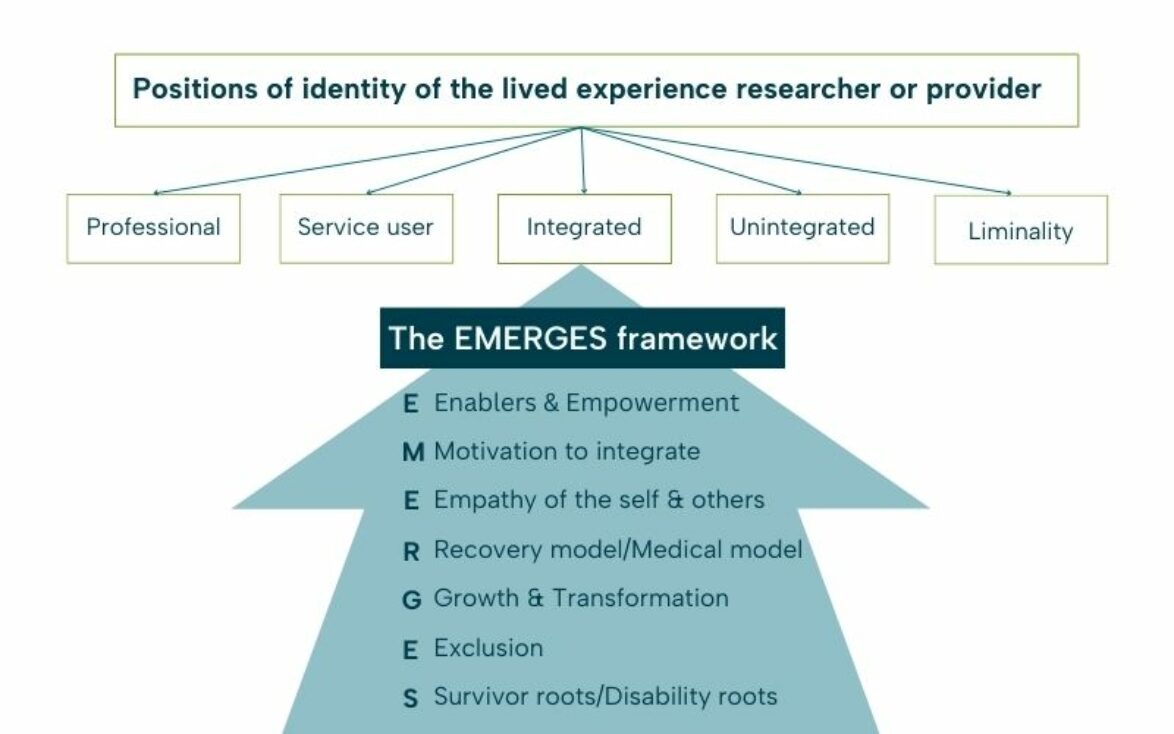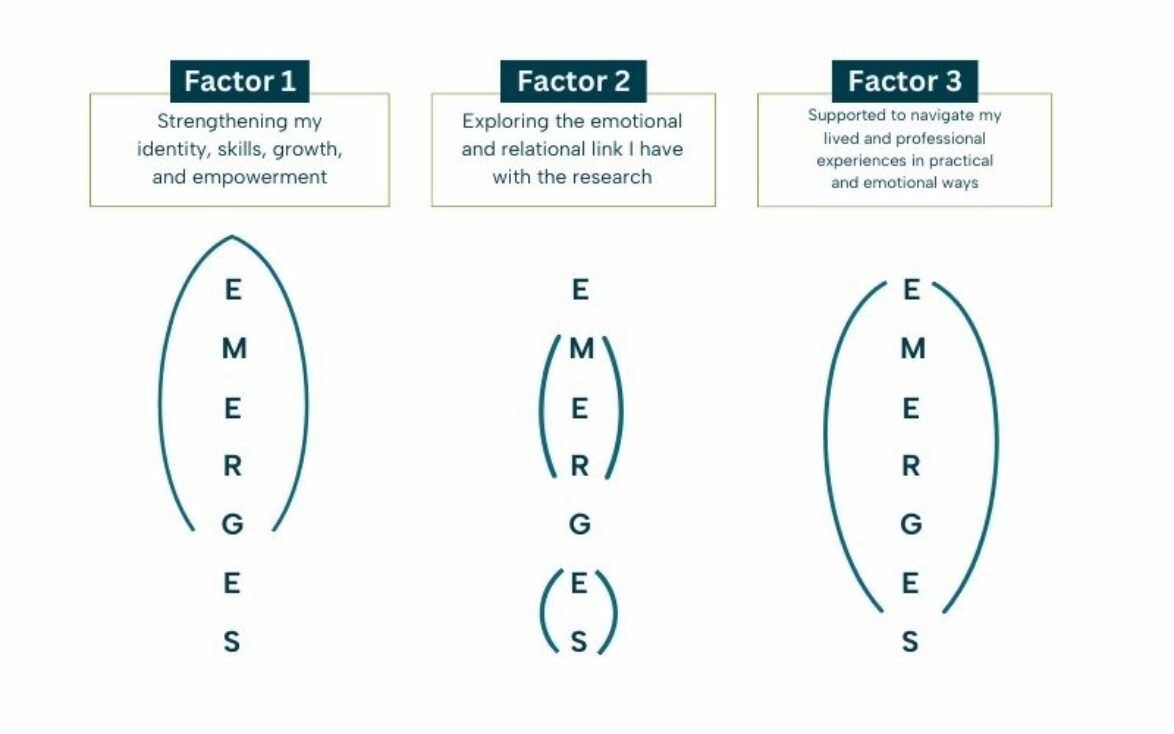A PhD student shares how her work into lived experience research ended up creating a framework that can lead to better research supervision and support.
Veenu Gupta
As a lived experience researcher my work is closely tied to my own experiences.
I’ve found this role has had a profoundly positive impact on my identity, recovery and empowerment. I felt it important to understand if and how the identity of others in lived experience roles were impacted. I wanted to explore this further in my work.
Moving between identities
A lived experience researcher is someone who has lived experience of mental health issues and uses these experiences to help inform research which better meets the needs of others in similar situations.
I came across many dilemmas in my role as a lived experience researcher, including personal and professional identities that I often moved between.
For example, I sometimes felt my effectiveness as a researcher was in doubt due to queries over my subjectivity towards the research.
There were other challenges that I experienced, including the emotional labour of the work, and how drawing on lived experiences was a complex process that required tailored support.
Currently, academic supervision is provided to some researchers, but clinical supervision is only available to clinicians, and not to lived experience researchers – despite them bringing complex service user and survivor histories to their work.
My research highlights the importance of both research and clinical supervision.
Understanding the identity of lived experience researchers and providers
To explore this, I conducted a systematic narrative review (Gupta et al, 2023) to understand the identity of lived experience researchers and providers.
We found lived experience researchers must navigate multiple positions of identity, including professional and service user, which are sometimes integrated, unintegrated or liminal.
The EMERGES framework was also developed as a result of this research, which encompassed seven core themes:
- Empowerment
- Motivation to integrate
- Empathy of the self and others
- Recovery model and medical model
- Growth and transformation
- Exclusion
- Survivor roots
The published systematic review can be found here: https://doi.org/10.1186/s40900-023-00439-0

These findings can help lived experience researchers understand the complexity of their roles and the difficulties they might experience. They could use the framework as a reflective tool to understand how they are affected by their lived experiences and role.
They can also help managers have some empathy for the difficulties that lived experience researchers experience. The framework can be used in supervision to frame discussions and provisions of support.
The three key types of lived experience researchers
To reduce the complexity of the findings from my PhD research, all the key ideas we found were presented to some lived experience researchers, who were asked to prioritise them as topics they would like to discuss in supervision.
Three different types of lived experience researchers emerged – although it’s interesting to note that emotional validation was central to all types of lived experience researcher.
- Factor 1: Strengthening my identity, skills, growth, and empowerment
Those who prioritised strengthening their identity, skills, growth, and empowerment through supervision were focused on identifying their training needs and wanted to work in ways that were affirmative, empowering and strengths based.
They were more concerned with moving away from their survivor roots and were reluctant to discuss their lived experiences as they did not want to be perceived as less skilled.
I think empowerment and recognition of growth are more of a priority.
A lived experience researcher participant
- Factor 2: Exploring the emotional and relational link I have with the research
Those who prioritised understanding their emotional and relational link with the research wanted to be reflexive.
They wanted to understand their relation to the research and reflect on the emotional burden of the research process.
They were keen to discuss their lived experiences, wellbeing, and the support or reasonable adjustments they required.
This researcher was likely to be conducting research closely tied to their own experiences and were more introspective in nature. This is the particular factor I personally identify most with.
Knowing that you can relate to the research topic and the participants because you know you have shared similar experiences is one thing - but knowing how to use this relatability during your work I find is a skill I don't know how to use naturally.
A lived experience researcher participant
- Factor 3: Navigating my lived and professional experiences practically and emotionally
The third factor identified a holistic spectrum of needs, accounting for moving between different lived experiences and professional experiences and being supported to overcome barriers they come across in their roles.
Practical, and emotional support was identified as important, including financial advice from supervisors.
…I have a personal life, but still need support to actually do the role in practical terms, yet with my supervisor providing emotional support when needed.
A lived experience researcher participant
Using the factors as researchers and managers
Using these factors as a guide, researchers can identify which type of lived experience researcher they might be at a given time – as they may move between the three types – and therefore they may differ in the specific needs they require from supervision.
Supervisors, in turn, can personalise supervision based on the different needs of the lived experience researcher by applying the relevant aspects of the EMERGES framework. This can help foster more productive and effective sessions.

Prompting better conversations
Overall, the lived experience researcher role is complex, and the EMERGES framework plus the three different factors of lived experience researcher can be used as ways to tailor and personalise support for them.
They can act as prompts to support topics of conversation or points to reflect on in supervision relevant to the needs of the lived experience researcher.
I found that the lived experience researcher role is complex where we bring both professional and personal expertise to our roles, justifying a hybrid type of support that draws on our identities, requiring research, clinical, and administrative support.
This research is a stepping-stone in developing the evidence-base around support designed specifically for the lived experience researcher.
References
Gupta, V., Eames, C., Golding, L. et al. Understanding the identity of lived experience researchers and providers: a conceptual framework and systematic narrative review. Res Involv Engagem 9,26 (2023). https://doi.org/10.1186/s40900-023-00439-0
